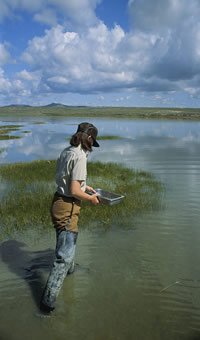Photo courtesy of USGS/
Biologist collecting samples
Posted 4/24/09 by Yasha Husain
Seattle, WA two years ago adopted a Zero Waste Strategy for reducing the amount of waste that is sent to landfills. The pioneering effort continues to be led by Seattle Council President, and founder of Sustainable Seattle, Richard Conlin.
Last March, the city took the Zero Waste Strategy to a new level. It now collects food wastes from single-family households, 100,000 homes, on a weekly basis. Families get carts in sizes that fit their needs that they put food waste into so it can be composted and used to make healthy soil.For more about the program, visit, Zero Waste Strategy.
See an interview of Richard Conlin on Democracy Now! from March 30, 2009.
For more on organic waste management, visit:
Article - EnvironmentTime for a New Direction for Fulton County's
Waste Management Operations
By Yasha Husain
First appeared in The Sunday Gazette (Schenectady, NY)
April 22, 2007
To save money down the road, and to do more to protect the environment in which people live and breathe, more responsible forms of waste management, the kinds taking place in Europe, Peel, Ontario in Canada, and San Francisco, could begin to be administered here.
At the Fulton County landfill on Mudd Road not only have household wastes been landfilled, but also construction and demolition materials, contaminated soils, industrial sludge from tanneries, wastes incoming from an area with an operating paper mill, sewage sludge, and asbestos.
While the landfill, which has been open since 1989, is considered state-of-the-art because it contains a double composite liner to minimize leakage and contain gases, regulations still allow a maximum of twenty gallons per acre per day of leakage. And the liner itself is helpless against the two main instigators of complete failures at landfills: 1) the deterioration of cover after the landfill has been capped and 2) clogging of leachate lines.
It happens frequently that the leachate lines at Fulton County's landfill (the pipes that carry accumulated liquids out of the landfill) need to be unclogged due to build up resulting from tannery sludge and daily cover composed of construction and demolition materials.
If the landfill is truly to have a 66 year life going foward, followed by 30 years of post closure monitoring, the cost to keep the leachate lines from clogging during all of that time could be astronomical.
Investing in a gas-to-energy plant to mitigate problems associated with emissions doesn't go far enough to address the underlying problems at the landfill, nor is it an incredibly environmentally-sound way of moving ahead.
Gas-to-energy won't stop the leachate lines from being clogged, and it will only capture an average of a third of the emissions to be released at the landfill over its lifetime.
The landfill's fourth expansion was recently completed and it involves thirteen and a half acres that have yet to be touched. The county should jump at the chance to become more restrictive regarding what contaminated wastes it collects there, and at the same time it should step up the effort to think outside the box and alter its existing collections and landfilling system.
Why People Are Making Change Happen
The main culprit causing emissions of methane and carbon dioxide from landfills is the organic wastes in the landfills, which through a process called anaerobic decomposition are slowly broken down, causing greenhouse gas emissions. Remove the organics and you no longer are faced with a problem that can stretch three or four decades, or even longer, into the future, as first and second waves of gas emissions are due to surface.
But keep the organics in the landfill and an upswell of hazardous chemicals and pollutants from the inorganic wastes rises with the methane and CO2.
Other places around the world are working on getting it right, and there's no reason Fulton County and surrounding areas can't be more reformist, too.
In the long run such initiatives should pay off for the residents of the community, environmentally and fiscally.
By far, the strongest move has been the European Parliament passing legislation that would make it mandatory in three years from the new directive's enactment for all EU countries to source separate organic wastes, such as foods, yard trimmings, and paper products, from inorganic wastes, to be treated separately.
In Europe, anaerobic digesters, used to encase organic materials above ground, are more frequently utilized to produce electricity from solid waste, and many consider this form of energy production to be cleaner than landfill gas-to-energy.
In the Peel region of Ontario and in the San Francisco Bay Area, separating organic from inorganic wastes, and stepping up the number of materials being recycled and reused, are becoming routine practices.
Composting, like landfill gas, could be responsible for offsetting fossil fuel consumption if used regularly. What it would produce, fertilizer, peat moss, erosion control materials, and other resources, could replace products that are normally harvested or manufactured using fossil fuels.
Back in Fulton County, people can compost organic wastes in their backyards and educational outreach can help to teach people how to do it if they don't already know.
Composting could be done on site at the landfill using source separated materials collected at the same time as recyclables as well as on additional pick-up days.
An anaerobic digester could also be installed at the landfill. The digester could hold only organic waste and be powered by a microturbine and generator the way the one at the Gloversville-Johnstown Joint Wastewater Treatment Facility is currently set to run.
There are many creative ways for Fulton County to see its way forward, not least of all by taking on environmentally- and fiscally-sound initiatives before they're required by law.
|
||||
